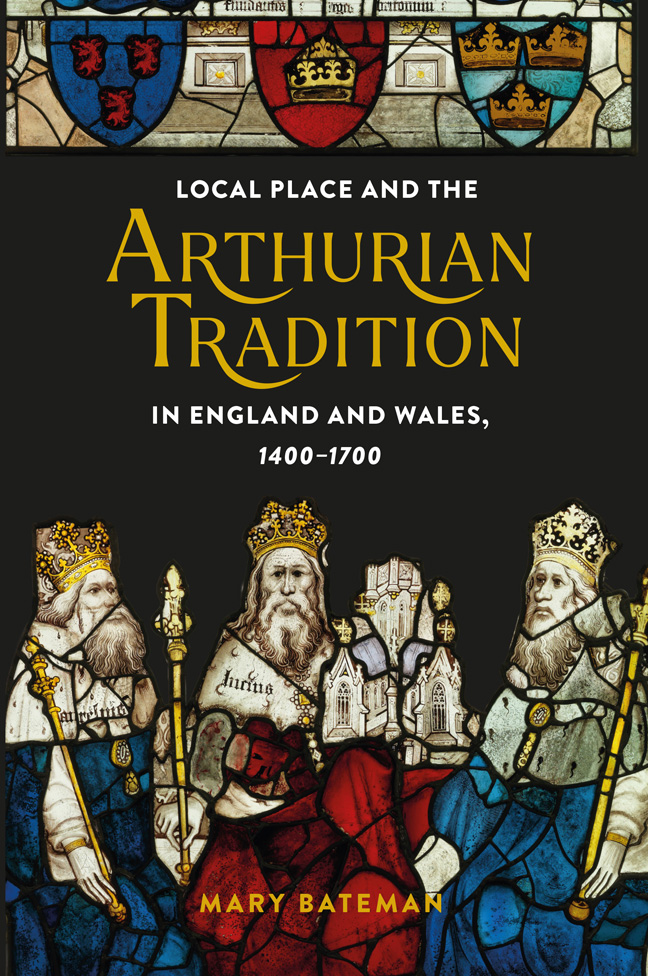Book contents
- Frontmatter
- Contents
- List of Illustrations
- Acknowledgements
- Introduction: Place and the defence of Arthur
- 1 ‘Thise were his places and his habitacions’: Arthur in situ in the fifteenth century
- 2 Contentious places: Reconciling Arthurian places in the fifteenth century
- 3 The best of the west: John Leland's West Country Arthur
- 4 Locating Arthur in England and Wales: John Leland, John Prise, and Elis Gruffydd
- 5 Placing Arthur in William Camden's Britannia
- Coda: Arthur's local renaissance?
- Bibliography
- Index
- Miscellaneous Endmatter
4 - Locating Arthur in England and Wales: John Leland, John Prise, and Elis Gruffydd
Published online by Cambridge University Press: 21 February 2024
- Frontmatter
- Contents
- List of Illustrations
- Acknowledgements
- Introduction: Place and the defence of Arthur
- 1 ‘Thise were his places and his habitacions’: Arthur in situ in the fifteenth century
- 2 Contentious places: Reconciling Arthurian places in the fifteenth century
- 3 The best of the west: John Leland's West Country Arthur
- 4 Locating Arthur in England and Wales: John Leland, John Prise, and Elis Gruffydd
- 5 Placing Arthur in William Camden's Britannia
- Coda: Arthur's local renaissance?
- Bibliography
- Index
- Miscellaneous Endmatter
Summary
While Leland was busy centring Arthur in South-West England, his contemporaries were carving out their own Arthurian regions elsewhere. This chapter examines the use of physical places as historical evidence in a series of texts written to defend the integrity of Arthur's history, especially as it appeared in Geoffrey of Monmouth's Historia regum Britanniae. For Arthur's defenders, Arthur's native places indicated a historical king that existed beneath the noise and disinformation of romance and fable, disinformation that was often framed as foreign interference. However, Arthur's defenders located his native sites differently, often in relation to their own sense of identity.
In order to shed light on how Arthur's emplacement could differ depending on the perspectives of his defenders, three Arthurian writers and their works provide excellent case studies. These figures include John Leland, whose geographical machinations were discussed in the previous chapter; Leland's contemporary and friend John Prise; and the Welsh chronicler Elis Gruffydd. These texts were composed between c. 1540 and 1568, shortly after the passing of the first Act of Union and Britain's split from Rome. Each writer's sense of Arthur's geography, and also of the source of the attack on Arthur's credibility, was coloured by their own sense of selfhood. Leland and Prise saw themselves as British, and identified the hostile attack on Arthur as Italian and Roman in origin, personified in the controversial figure of the historian Polydore Vergil. Leland and Prise's rebuttals to Polydore formed a coordinated effort, for it is evident that the pair worked together to rebut Polydore. In contrast – and despite a 2018 press release dubbing him a ‘British Tommy’ – Elis Gruffydd clearly identified as Welsh, not British. For him, the British were a discrete historic people group ending with Llywelyn. Gruffydd's ideas about foreign attacks on the British History are quite different to his contemporaries: he presents the English as the hostile party. As such, the majority of Gruffydd's references to Arthurian sites concern places in his native North Wales, and he often rejects English Arthurian places as unreliable.
The context: Arthur and the nation in the sixteenth century
This chapter's broad aim is to show how Leland, Prise, and Gruffydd each held a different sense of Arthurian geography depending on their own senses of native identity.
- Type
- Chapter
- Information
- Publisher: Boydell & BrewerPrint publication year: 2023



